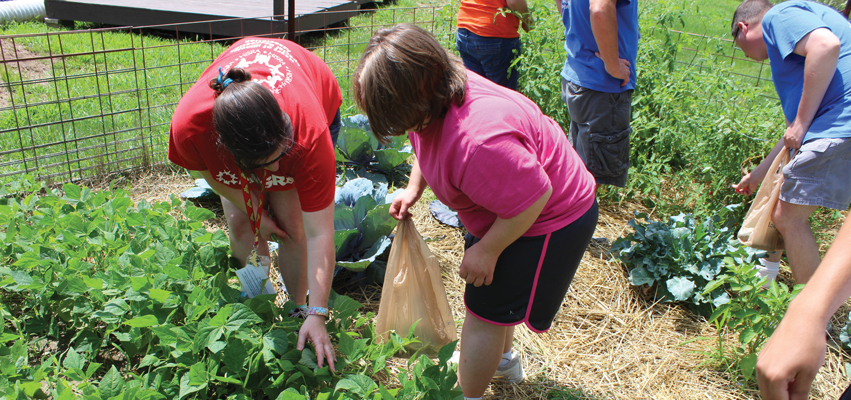
Blue Ridge Community Farm provides individuals with special needs a unique space to learn, explore and just be themselves on a nonprofit working farm just north of Chillicothe.
Laura and James Sniff were living in Dunlap with their children Jimmy and Allison when they purchased the farm with retirement in mind. Jimmy has special needs and was just starting school when they hosted a field trip for his classmates. Parents and teachers appreciated how the students responded to the calm, welcoming atmosphere on the farm, and the trips became a tradition, says Laura Sniff. “They immediately feel at ease here because everybody knows they’re not going to be judged—they can just BE, which is awesome.”
Concerned about Jimmy’s options as he grew older and inspired by similar organizations in Texas and Indiana, the Sniffs felt compelled to provide opportunities for other adults with disabilities and share their farm with the community. Blue Ridge officially became a nonprofit in 2014, and now hosts close to 1,000 visitors from May through November.
The 245-acre farm has fields of corn and soybeans, 2.5 miles of hiking trails, five primitive campsites and a pond, as well as alpacas, donkeys, chickens, golden retrievers and a horse. Guests love to interact with the animals and Sniff has countless stories of special moments, including a young girl with Down syndrome who had not previously responded well to animals. “By the end of the morning she was kissing the donkeys, laying on our dogs, and marching right into the pasture with carrots and feeding these big alpacas with no fear,” Sniff recalls. “We see things like that all the time, and it’s amazing.”

Besides school field trips, Blue Ridge works with organizations like EP!C, PUP and the Heart of Illinois Special Recreation Association for their adult programs and summer camps. The farm has a hoop house garden (with two more in the works) which the groups help plant and maintain; participants can then cook meals with produce they grew themselves, in addition to learning about agriculture and animal husbandry.
Other activities include an annual barn dance, bonfires, movies in the barnyard, arts and crafts projects, and music therapy—and the Sniffs intend to soon offer an employment program for adults with disabilities. Blue Ridge relies on donations and volunteers, but the Sniffs hope to develop it into a self-sustaining organization with housing for adults, a gift shop to sell alpaca products, and a community center for year-round programming.
Blue Ridge is also open to organizations like church groups and scout troops for camping and service projects. “We call it a ‘community farm’ because we want the community to be involved and get to know people with special needs,” Sniff says. “Their abilities are amazing and they can do so much if just given an opportunity.” Visit blueridgecommunityfarm.org for more information. iBi

